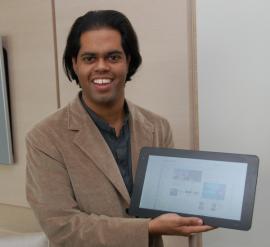TechCrunch Files Lawsuit Against Fusion Garage
TechCrunch has filed a federal suit against Fusion Garage, its partner on the CrunchPad project.
Filed yesterday citing Fraud and Deceit, Misappropriation of Business Ideas, Breach of Fiduciary Duty, Unfair Competition and Violations of the Lanham Act, the lawsuit was inevitable. Michael Arrington promised readers he would be taking legal action when he wrote about the whole CrunchPad/Fusion Garage fiasco a few weeks back.
TechCrunch goes on to list eight "additional thoughts" regarding the entire situation. These read more like reasons Fusion Garage is not to be trusted but are summarized below anyway:
- TechCrunch provided documentation to back up all claims while Fusion Garage has made statements regarding TC that lack any evidence.-Fusion Garage recently deleted its blog. Arrington says the blog contained a lot of statements that directly contradicted made by Fusion Garage this week. -Fusion Garage "is, and always has been, a company on the very edge of going out of business."- Investors were reportedly unhappy about the information uncovered during background checks into Fusion Garage and its founder but agreed to support the project anyway.-Fusion Garage's financial situation "is a mess." According to Arrington it is inappropriate for the press to recommend to people to pre-buy a CrunchPad. He claims Fusion Garage has yet to hire an attorney to address the suit filed yesterday and believes this is because they do not have the cash flow to do so.-Much of the key intellectual property (including the board and much of the mechanicals) is owned by ODM, Pegatron. Fusion Garage has hired a new ODM and Pegatron has allegedly expressed concerns about their IP being used by the new ODM in order to speed development.-Finally, Arrington says the founder of Fusion Garage, Chandrasekar Rathakrishnan "isn’t a good guy." According to TechCrunch, Chandra has been caught plagiarizing articles and previous company Radixs disintegrated in shareholder disputes and angry employees. This is something TechCrunch did not find out until last summer.
Arrington's additional thoughts on the matter aside, Engadget's Nilay Patel last week posted an interesting piece regarding the whole mess. Patel reports that there doesn't appear to be a contract between the two companies, which is not a good place to be in:
"Assuming there isn't some secret CrunchPad patent application we don't know about, the only major IP rights we can see TechCrunch asserting to the CrunchPad device have to do with the copyright to the code, and that's a total mess. Since Arrington apparently didn't draw up a contract giving him sole copyright to the CrunchPad's code, he and his lawyers are arguing that TechCrunch and Fusion Garage are "joint owners" to any rights, and that's just about the weakest position Arrington can be in. Joint copyright owners are legally considered to have equal rights to the entire product, and unless there's a written agreement (see how that keeps coming up?) saying they both have to sign off, each joint owner is allowed to non-exclusively sell the entire thing without the other's approval. In our experience it's pretty rare for joint copyright ownership to be an ideal business arrangement, and we can't imagine how Arrington got to within three days of launching the CrunchPad without hammering out the details of who owned what."
Patel also mentions Arrington's former career as an attorney and further questions how Arrington managed to find himself in this kind of situation in the first place.
The whole story makes for a decent read so be sure to check it out here. You can read Michael Arrington's unabridged thoughts and check out the lawsuit on TechCrunch.
Get Tom's Hardware's best news and in-depth reviews, straight to your inbox.
Who do you think is in the wrong here? Let us know in the comments below!

Jane McEntegart is a writer, editor, and marketing communications professional with 17 years of experience in the technology industry. She has written about a wide range of technology topics, including smartphones, tablets, and game consoles. Her articles have been published in Tom's Guide, Tom's Hardware, MobileSyrup, and Edge Up.
-
chris13th I cannot take any of this seriously just because of how stupid the guy in the picture looks.Reply -
tsnorquist The possibilities of creative avatars are endless with that picture. Toms should have a photoshop and or caption contest.Reply -
ssalim darkknight22building a caveman is so easy, even a caveman could do it. as seen in picture.Reply
That doesn't make any sense until you did a typo.
Regardles the caveman pic, which I agree, lol... well that is all I have to say. -
gbismack $500 for a crippled tablet???? People where excited about the original because it was supposed to be $200. So the company steals the plans and increases the price 2.5X!Reply
